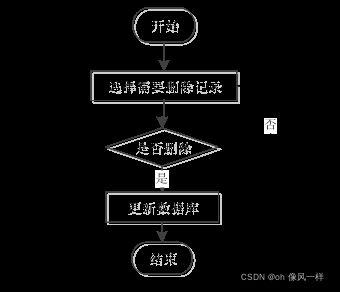基于SpringBoot的校园疫情管理系统
摘要
2019年12月19号中国武汉发生第一例新冠病毒的到来,大家都在听从政府的号召在居家隔离,不管是在城市还是在乡镇、农村,这引起我的注目,设计一套校园疫情防控系统,疫情防控需要大家共同努力、团结对学校学生进行了新型冠状病毒肺炎防控知识普及和宣传教育,通过学校广播、教室发宣传单、老师给学生谱及防疫知识,社会也可以通过微信群、短信等多种形式,从个人防护知识、居家防护知识、外出公共场所防护知识、新型冠状病毒肺炎医学知识、就医流程五个方面,有针对性地向学校学生普及了防疫知识。充分做到疫情防控人人知晓、人人参与认识病毒的可怕,最好方式就是建立学校的平台信息,并对其进行管理。
我通过对新冠病毒的到来懵生了开发一套关于校园疫情防控系统,本系统采用了Java技术,将所有业务模块采用以浏览器交互的模式,选择MySQL数据库,springboot作为系统的后台框架,开发工具选择My eclipse来进行系统的设计。基本实现了校园疫情防控系统应有的主要功能模块,本系统有管理员、学生。管理员:首页、个人中心、核酸检测管理、体温状态管理、学生管理、学生状态管理、休假申请管理、出入登记管理、疫情知识管理、论坛管理、系统管理。学生权限;首页、个人中心、学生状态管理、休假申请管理、出入登记管理;前台首页:首页、出入登记、疫情知识、论坛信息、疫情公告、个人中心、后台管理、客服等操作。
对系统进行测试,是为了改善了程序逻辑和代码。同时确保系统中所有的程序都能正常运行,所有的功能都能操作,并且该系统有很好的操作体验,实现了对于校园疫情防控系统和护工管理、学校学生管理、政府部门双赢。
**关键词:**校园疫情防控系统;springboot框架 ;Mysql数据库;Java语言
系统流程分析
1、系统登录流程图
2、添加信息流程图
3、删除信息流程图
系统设计
1、系统结构图
2、开发流程设计
系统流程的分析是通过调查系统所涉及问题的识别、可行性、可操作性、系统分析处理能力等具体环节来调节、整理系统的设计方案以确保系统能达到理想的状态。这些操作都要从注册、登录处着眼进行一系列的流程测试保证数据库的完整,从而把控系统所涉及信息管理的安全、保证信息输入、输出正常转换。然后,通过实际操作完成流程图的绘制工作。
3、数据库设计原则
学习编程,我们都知道数据库设计是基于需要设计的系统功能,我们需要建立一个数据库关系模型,用于存储数据信息,这样当我们在程序中时,就没有必要为程序页面添加数据,从而提高系统的效率。数据库存储了很多信息,可以说是信息管理系统的核心和基础,数据库还为系统提供了添加、删除、修改和检查等操作模块,使系统能够快速找到自己想要的信息,而不是在程序代码中找到。
功能截图
1、校园疫情防控系统,在管理员登录系统的首页可以通过填写账号/密码、选择角色进行登录操作等信息
2、管理员首页,管理员进入校园疫情防控系统查看个人中心、核酸检测管理、体温状态管理、学生管理、学生状态管理、休假申请管理、出入登记管理、疫情知识管理、论坛管理、系统管理操作

3、核酸检测管理,通过核酸检测管理内容列表可以获取核酸检测、核酸状态等信息可进行详情、修改、删除或查看操作

4、学生管理,通过学生管理内容列表获取景区学号、密码、学生姓名、性别、头像、专业、班级、住址省份、市级、县级、手机、邮箱等信息可进行详情、修改、删除或查看操作。

5、休假申请管理,通过休假申请管理内容列表可以获取申请编号、申请标题、休假天数、行程城市、途径城市、申请日期等信息可进行详情、修改、删除或查看操作

6、出入登记管理,通过出入登记管理内容列表可以获取登记标题、登陆类型、登记时间、备注、学号、学生姓名、性别、头像、实时体温、手机、班级、专业、审核回复、审核状态、审核等信息可进行详情、修改、删除或查看等操作

相关代码
数据库配置
# Tomcat
server:
tomcat:
uri-encoding: UTF-8
port: 8080
servlet:
context-path: /springboot81644
spring:
datasource:
driverClassName: com.mysql.jdbc.Driver
url: jdbc:mysql://127.0.0.1:3306/springboot81644?useUnicode=true&characterEncoding=utf-8&useJDBCCompliantTimezoneShift=true&useLegacyDatetimeCode=false&serverTimezone=UTC
username: root
password: 123456
servlet:
multipart:
max-file-size: 10MB
max-request-size: 10MB
resources:
static-locations: classpath:static/,file:static/
#mybatis
mybatis-plus:
mapper-locations: classpath*:mapper/*.xml
#实体扫描,多个package用逗号或者分号分隔
typeAliasesPackage: com.entity
global-config:
#主键类型 0:"数据库ID自增", 1:"用户输入ID",2:"全局唯一ID (数字类型唯一ID)", 3:"全局唯一ID UUID";
id-type: 1
#字段策略 0:"忽略判断",1:"非 NULL 判断"),2:"非空判断"
field-strategy: 2
#驼峰下划线转换
db-column-underline: true
#刷新mapper 调试神器
refresh-mapper: true
#逻辑删除配置
logic-delete-value: -1
logic-not-delete-value: 0
#自定义SQL注入器
sql-injector: com.baomidou.mybatisplus.mapper.LogicSqlInjector
configuration:
map-underscore-to-camel-case: true
cache-enabled: false
call-setters-on-nulls: true
#springboot 项目mybatis plus 设置 jdbcTypeForNull (oracle数据库需配置JdbcType.NULL, 默认是Other)
jdbc-type-for-null: 'null'
控制层(Controller)
package com.controller;
import java.util.Arrays;
import java.util.Calendar;
import java.util.Date;
import java.util.Map;
import javax.servlet.http.HttpServletRequest;
import org.springframework.beans.factory.annotation.Autowired;
import org.springframework.stereotype.Controller;
import org.springframework.web.bind.annotation.GetMapping;
import org.springframework.web.bind.annotation.PathVariable;
import org.springframework.web.bind.annotation.PostMapping;
import org.springframework.web.bind.annotation.RequestBody;
import org.springframework.web.bind.annotation.RequestMapping;
import org.springframework.web.bind.annotation.RequestParam;
import org.springframework.web.bind.annotation.ResponseBody;
import org.springframework.web.bind.annotation.RestController;
import com.annotation.IgnoreAuth;
import com.baomidou.mybatisplus.mapper.EntityWrapper;
import com.entity.TokenEntity;
import com.entity.UserEntity;
import com.service.TokenService;
import com.service.UserService;
import com.utils.CommonUtil;
import com.utils.MPUtil;
import com.utils.PageUtils;
import com.utils.R;
import com.utils.ValidatorUtils;
/**
* 登录相关
*/
@RequestMapping("users")
@RestController
public class UserController{
@Autowired
private UserService userService;
@Autowired
private TokenService tokenService;
/**
* 登录
*/
@IgnoreAuth
@PostMapping(value = "/login")
public R login(String username, String password, String captcha, HttpServletRequest request) {
UserEntity user = userService.selectOne(new EntityWrapper<UserEntity>().eq("username", username));
if(user==null || !user.getPassword().equals(password)) {
return R.error("账号或密码不正确");
}
String token = tokenService.generateToken(user.getId(),username, "users", user.getRole());
return R.ok().put("token", token);
}
/**
* 注册
*/
@IgnoreAuth
@PostMapping(value = "/register")
public R register(@RequestBody UserEntity user){
// ValidatorUtils.validateEntity(user);
if(userService.selectOne(new EntityWrapper<UserEntity>().eq("username", user.getUsername())) !=null) {
return R.error("用户已存在");
}
userService.insert(user);
return R.ok();
}
/**
* 退出
*/
@GetMapping(value = "logout")
public R logout(HttpServletRequest request) {
request.getSession().invalidate();
return R.ok("退出成功");
}
/**
* 密码重置
*/
@IgnoreAuth
@RequestMapping(value = "/resetPass")
public R resetPass(String username, HttpServletRequest request){
UserEntity user = userService.selectOne(new EntityWrapper<UserEntity>().eq("username", username));
if(user==null) {
return R.error("账号不存在");
}
user.setPassword("123456");
userService.update(user,null);
return R.ok("密码已重置为:123456");
}
/**
* 列表
*/
@RequestMapping("/page")
public R page(@RequestParam Map<String, Object> params,UserEntity user){
EntityWrapper<UserEntity> ew = new EntityWrapper<UserEntity>();
PageUtils page = userService.queryPage(params, MPUtil.sort(MPUtil.between(MPUtil.allLike(ew, user), params), params));
return R.ok().put("data", page);
}
/**
* 列表
*/
@RequestMapping("/list")
public R list( UserEntity user){
EntityWrapper<UserEntity> ew = new EntityWrapper<UserEntity>();
ew.allEq(MPUtil.allEQMapPre( user, "user"));
return R.ok().put("data", userService.selectListView(ew));
}
/**
* 信息
*/
@RequestMapping("/info/{id}")
public R info(@PathVariable("id") String id){
UserEntity user = userService.selectById(id);
return R.ok().put("data", user);
}
/**
* 获取用户的session用户信息
*/
@RequestMapping("/session")
public R getCurrUser(HttpServletRequest request){
Long id = (Long)request.getSession().getAttribute("userId");
UserEntity user = userService.selectById(id);
return R.ok().put("data", user);
}
/**
* 保存
*/
@PostMapping("/save")
public R save(@RequestBody UserEntity user){
// ValidatorUtils.validateEntity(user);
if(userService.selectOne(new EntityWrapper<UserEntity>().eq("username", user.getUsername())) !=null) {
return R.error("用户已存在");
}
userService.insert(user);
return R.ok();
}
/**
* 修改
*/
@RequestMapping("/update")
public R update(@RequestBody UserEntity user){
// ValidatorUtils.validateEntity(user);
userService.updateById(user);//全部更新
return R.ok();
}
/**
* 删除
*/
@RequestMapping("/delete")
public R delete(@RequestBody Long[] ids){
userService.deleteBatchIds(Arrays.asList(ids));
return R.ok();
}
}
业务层(Service)
package com.service;
import java.util.List;
import java.util.Map;
import org.apache.ibatis.annotations.Param;
import com.baomidou.mybatisplus.mapper.Wrapper;
import com.baomidou.mybatisplus.service.IService;
import com.entity.UserEntity;
import com.utils.PageUtils;
/**
* 系统用户
* @author yangliyuan
* @date 2019年10月10日 上午9:18:20
*/
public interface UserService extends IService<UserEntity> {
PageUtils queryPage(Map<String, Object> params);
List<UserEntity> selectListView(Wrapper<UserEntity> wrapper);
PageUtils queryPage(Map<String, Object> params,Wrapper<UserEntity> wrapper);
}
数据访问层(Dao)
package com.dao;
import java.util.List;
import org.apache.ibatis.annotations.Param;
import com.baomidou.mybatisplus.mapper.BaseMapper;
import com.baomidou.mybatisplus.mapper.Wrapper;
import com.baomidou.mybatisplus.plugins.pagination.Pagination;
import com.entity.UserEntity;
/**
* 用户
*/
public interface UserDao extends BaseMapper<UserEntity> {
List<UserEntity> selectListView(@Param("ew") Wrapper<UserEntity> wrapper);
List<UserEntity> selectListView(Pagination page,@Param("ew") Wrapper<UserEntity> wrapper);
}



